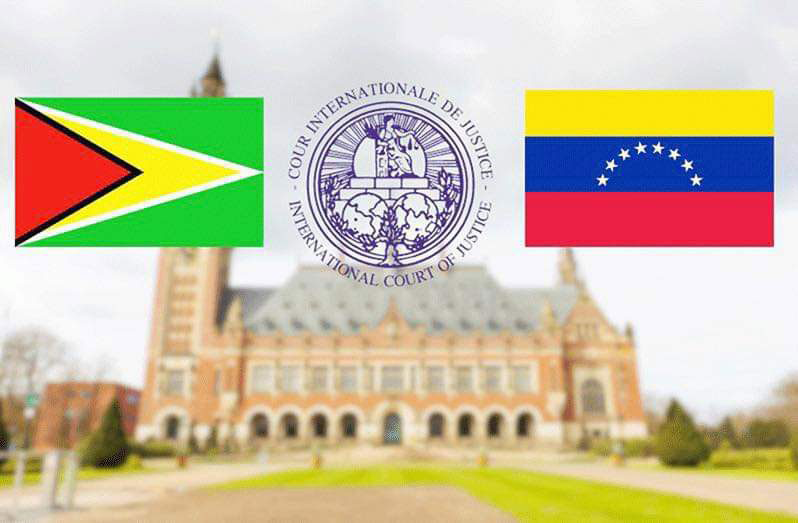— Government reaffirms Essequibo belongs to Guyana
THE Government of Guyana has called on Venezuela to “act responsibly” and comply fully with the legally binding orders of the International Court of Justice (ICJ), which prohibits Caracas from conducting elections in the disputed Essequibo region.
In the official release from the Ministry of Foreign Affairs and International Cooperation, Guyana called on Venezuela to comply with the binding Orders issued by the ICJ on December 1, 2023, and May 1, 2025.
The Orders direct Venezuela to refrain from taking any steps such as elections to assert authority over the territory, which the Court confirmed is administered and controlled by Guyana.
The latest ICJ Order came after Venezuela announced in January plans to hold elections for a so-called “Guayana Esequiba State,” a term used by Venezuela to refer to Guyana’s Essequibo region.
“The Government of Guyana expects that the Government of Venezuela will act responsibly… and fully respect the sovereignty and territorial integrity of Guyana,” the statement said.
Guyana also reiterated that it will not enter into bilateral negotiations with Venezuela over the territory, emphasising that the matter is already before the International Court of Justice.
That case concerning Venezuela’s rejection of the 1899 Arbitral Award which defined the boundary was referred to the ICJ by the United Nations Secretary-General, in line with the 1966 Geneva Agreement.
Guyana further called on Venezuela to move beyond “lip service” to the Geneva Agreement and to comply with its terms, particularly Article IV(2), which recognises the role of the ICJ in settling the controversy.
“The Court’s judgement will be definitive, final and binding on Guyana and Venezuela,” the statement read.
The Ministry’s response comes just one day after the ICJ ruled 12–3 in favour of Guyana’s request for provisional measures to prevent Venezuela from organising any elections in the contested region, reaffirming Guyana’s stance that the Essequibo is sovereign Guyanese territory.
The court in its December 1, 2023 order stated: “Pending a final decision in the case, the Bolivarian Republic of Venezuela shall refrain from taking any action which would modify the situation that currently prevails in the territory in dispute for which the Cooperative
Republic of Guyana administers and exercises control over that area; and both parties shall refrain from any action which might aggravate or extend the dispute before the court or make it more difficult to resolve.”
This is the second time Guyana has sought provisional measures from the Court.
Recently, a Venezuelan naval vessel, the ABV Guaiqueiri PO-11-IMO 469552, entered Guyana’s Exclusive Economic Zone on March 1, 2025, coming dangerously close — approximately 700 meters—to the FPSO PROSPERITY, which was operating lawfully under a licence issued by Guyana.
The Venezuelan vessel made threatening radio communications, falsely claiming that the FPSO PROSPERITY was operating in Venezuela’s Exclusive Economic Zone.
It then proceeded southwest, repeating the same aggressive message to other FPSOs operating in the region.
“This latest action by the Government of Venezuela has done nothing but pose a threat to the peace, good order, and security of the sovereign territory of the Cooperative Republic of Guyana, and the stability of the Latin American and Caribbean region,” Guyana’s Ministry of Foreign Affairs had said.
The ministry further noted that just months prior, Venezuela completed a controversial bridge connecting its mainland to the Ankoko Island.
Back in December 2024, Guyana submitted its final written brief to the ICJ on the border matter.
The submission, titled “Guyana’s Reply to Venezuela’s Counter-Memorial”, was personally delivered to the Court by Guyana’s Ambassador to Brussels, Sasenarine Singh, marking a critical step in the case that has been ongoing for over six years.
After Guyana’s submission, Venezuela will have the opportunity to file its rejoinder by August 2025, responding to Guyana’s reply. Once both sides have submitted their written pleadings, the Court will schedule oral hearings.
Two years ago, the two countries signed the Argyle Declaration, reaffirming their commitment to peace and stability in the region, despite the ongoing controversy. Despite these diplomatic efforts, Venezuela has continued to take steps to aggravate the situation.





.jpg)








